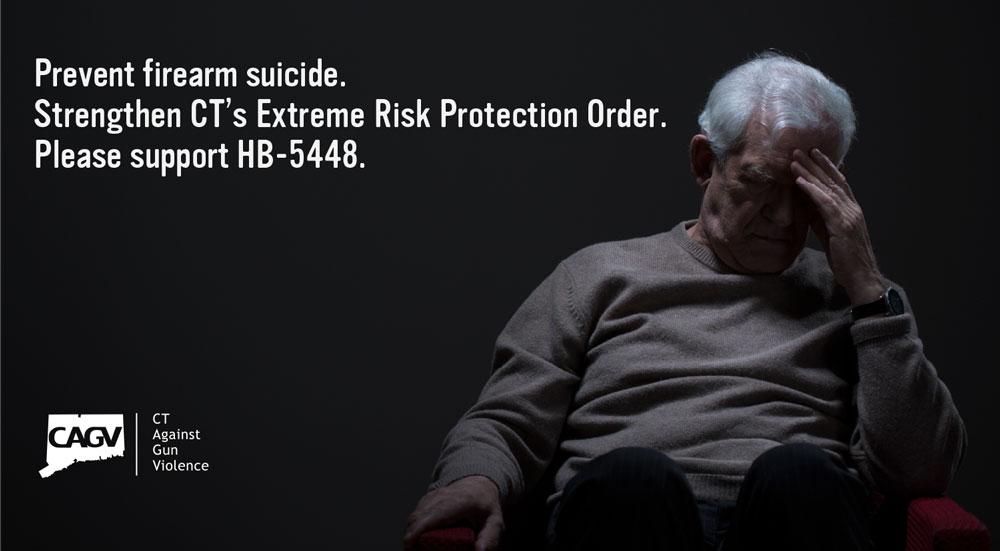20 Years Later, It’s Time to Update CT’s Extreme Risk Protection Order Law


Connecticut was the first state in the nation to implement an Extreme Risk Protection Order (ERPO) law, in 1999 following a mass shooting in the CT Lottery headquarters by a disgruntled employee who friends had reported to the police as being suicidal. He was known to have guns at home, but at the time there was nothing that could be done to remove them.
The ERPO measure created a legal mechanism—with due process protections for gun owners’ Second Amendment rights—for anyone to warn the police about a person they believe is at risk of imminent harm to themselves or others and who may have access to firearms. If the police find there is a risk of imminent harm, they can ask a Superior Court judge issue a “risk warrant” allowing the firearms to be removed and held for up to one year.
After more than 20 years since Connecticut’s ERPO law was enacted, it is time to strengthen its provisions to make it work harder to save lives.
Extreme Risk Protection laws save lives. As reported in a 2017 Duke-Yale-UCONN study, for every 10 to 20 risk protection orders issued in Connecticut, one suicide is prevented. Recent cases in Stafford and Norwalkdemonstrate how ERPO protects the public from potential mass shootings as well.
A study of 159 protection orders issued in California identified 21 where removing guns likely averted mass shootings. Guns were removed from at least four individuals who posed “significant threats” to schools in the first three months after Maryland implemented its extreme risk law.
Until 2014, Connecticut and Indiana were the only states with ERPOs. Then, in 2014 following the Isla Vista shooting in Santa Barbara, California passed an ERPO-type law (theirs is called a Gun Violence Restraining Order). The shooter’s parents had notified the police of concerns that he might be violent; police visited his apartment, but had no legal authority to remove his firearms.
To date, 18 states and D.C. have implemented ERPO laws, most following the Parkland school massacre where the shooter’s mother had repeatedly called the police to her home in response to her son’s violent behavior. He was known to have firearms and to have posted threatening statements on social media.
What changes to CT’s ERPO are proposed in HB-5448?
Compared to ERPO laws in other states, there are opportunities to strengthen Connecticut’s law. That is why the CT General Assembly’s Judiciary Committee raised House Bill 5448, An Act Concerning A Risk Protection Order or Warrant. It seeks four modifications to Conn. Gen. Statute Sec. 29-38c:
- Allow family and household members, and healthcare professionals, to directly petition the court for a risk protection order, rather than relying on law enforcement to apply for the protection order.
- Require only one police officer, not two, to petition the court for a risk protection order.
- Allow a risk protection order to be issued to prohibit an individual from buying a firearm if that individual is at risk of imminent harm to self or others, even if s/he doesn’t currently possess a firearm.
- Require a court hearing to demonstrate that the risk of imminent harm no longer exists before firearms are returned. The subject of the risk protection order may petition the court for return of his firearms every six months.
Why are these changes being proposed?
Under Connecticut’s current law, only law enforcement or a state’s attorney can petition the court for a risk protection order (although currently any member of the public may alert police to a concern about a potentially violent individual who may have access to firearms.) The proposed change would provide an avenue for petitioning the court directly in situations where a family or household member, or healthcare professional, may not want to immediately involve law enforcement. This is how ERPOs work in most other states. The risk of fraudulent petitions being used to harass a gun owner (a claim made by opponents of the bill) is low; applications are signed under penalty of perjury. There is no evidence to suggest that family members or others would risk a felony conviction to harass or disarm a gun owner.
Under current law, two police officers must sign the application for a risk protection order. This can cause delays that put people at risk in off-hours in jurisdictions with limited staff. Due process protections are already in place that make it unnecessary for this added burden for law enforcement to apply for a risk protection order.
Under current law, an ERPO can only be issued if the subject is already in possession of a firearm. Expanding the law to protect against situations where an individual would be at risk of imminent harm if he had access to a firearm, even if not currently in possession of one, could save lives. Additionally, because CT doesn’t require most firearms to be registered, there is no way to definitively know if someone is in possession of a firearm. Public safety is put at risk if firearms can be removed only upon proof that the individual actually possesses one. The same burden of proof of risk of imminent harm to self or others would apply.
Under current law, the subject of a risk protection order is able to retrieve his firearms upon expiration of the warrant without any burden of proof that he no longer represents a risk of imminent harm (warrants can be in force for up to one year). Public safety is in jeopardy if firearms are returned without ascertaining if the risk of imminent harm no longer pertains.
What can you do to help pass HB-5448?
There are two ways you can show your support for HB-5448: submit written testimony and/or ask your state legislators to co-sponsor the bill.
Submit written testimony
With all that’s going on with the coronavirus threat, it’s understandable that our minds are on that, and not on the regular order of business. But that hasn’t kept the opponents of common-sense gun laws from working overtime to oppose HB-5448.
On the CT General Assembly’s webpage where written testimony for HB-5448 is posted there are more than 400 submissions, the overwhelming majority are in opposition to HB-5448! (Note, due to coronavirus disruptions, there are delays in posting recently submitted testimony.)
We cannot afford to let our voices be drowned out by people who vehemently oppose extreme risk laws that are saving lives. Click here for guidance on writing and submitting testimony. It doesn’t have to be long to be effective; two or three paragraphs are fine.
Ask your legislators to co-sponsor HB-5448
Co-sponsoring is a public statement of commitment and a message to leadership that rank and file legislators want a bill called for a vote. It’s impossible to say how the coronavirus crisis will impact the remainder of the 2020 legislative session, but it’s very likely a far smaller number of bills will be passed than in ordinary times. Getting as many legislators to co-sponsor the bill as possible could improve its chances of moving forward. Click here for an action form from CT Against Gun Violence that makes it easy to email your state representative and senator asking them to co-sponsor HB-5448.
One of our country’s most important freedoms is that of free speech.
Agree with this essay? Disagree? Join the debate by writing to DailyClout HERE.




